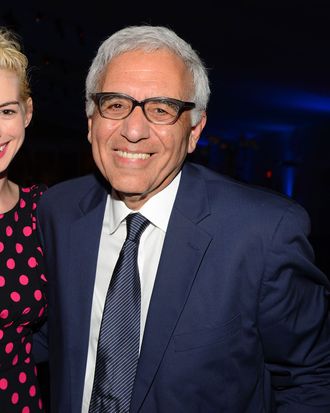
With its white stone fa├ºades and noble arcades, Lincoln Center looks as though itÔÇÖs always been there and always will be, a 1960s Acropolis that glows afresh each night, constantly rejuvenated by daily infusions of the performing arts. But in 2002, when Reynold Levy took over as president of an entity thatÔÇÖs really more a collection of principalities than a unified organization, the campus looked older, sadder, and lonelier. The travertine was streaked, the pavers pocked, and the air conditioners grumbled. On rainy nights, audiences exiting the halls picked their way around lagoons that leaked into the garage below the plaza. West 65th Street looked like the back end of a big-box store. In a new memoir, They Told Me Not to Take That Job: Tumult, Betrayal, Heroics, and the Transformation of Lincoln Center (PublicAffairs), Levy describes what it took to turn a beloved relic into an artistic engine. His answer, of course, is: him. Well ÔǪ him, plus $1.2 billion.
For those of us whose philanthropic donations generally hover around the high two figures, the concept of raising that much money in multi-million-dollar chunks is hard to reckon. Indeed, the task had already stumped several chief executives, especially since it required wrangling an amoeboid mess of an institution. Some parts, like the Film Society and the Chamber Music Society, barely recognized each other. Others competed for resources, audiences, and glory. But Levy, with his persuasive handshake and owlish mien, proved to be the administrative virtuoso that Lincoln Center had been waiting for. No need to take his word for it: Just walk around. The campus today is exactly what he and the architect Elizabeth Diller (a founding partner at Diller Scofidio + Renfro) said it would be: the same, only busier, more open, more glamorous, more comfortable, and more fun. If the renovation were a movie, its credit roll would run for 20 minutes, but it would be fair to call it a Reynold Levy production.
ItÔÇÖs not surprising, then, that he subscribes to the ÔÇ£great menÔÇØ theory of history: In apportioning the components of the bookÔÇÖs subtitle, heÔÇÖs allotted himself the heroics and assigned the betrayal part to others. And if his account of the gentle squeeze that he applied to various moguls isnÔÇÖt exactly the stuff of Napoleonic exploits, his results, unlike NapoleonÔÇÖs, were unambiguously good. If a book-length paean to balanced budgets sounds like a snooze, consider this: New York City Opera, which was decimated by AIDS but survived it, succumbed in the end to preventable fiscal wounds.
Every great leader needs a passel of weak ones to make him shine. Levy is gleefully ruthless in his portrayals of City OperaÔÇÖs board president Susan Baker and its last executive director, George Steel, whom he essentially accuses of chasing the company over the edge of a financial precipice. SteelÔÇÖs predecessor Paul Kellogg gets hammered for trying to blaze a dead-end road out of Lincoln Center: The company was moving to ground zero! No, wait, it was building a new opera house on Amsterdam Avenue, a few blocks away! No, actually it wasnÔÇÖt, but Kellogg projected such profound unhappiness with the State (now David H. Koch) Theater that audiences took his advice and stayed away. Levy also strafes New York Philharmonic ex-chairman Paul Guenther, who tried to force the orchestra into a nonsensical merger with Carnegie Hall. That misadventure was abetted by thenÔÇôexecutive director Zarin Mehta, desperate to avoid the misery and expense of renovating the orchestraÔÇÖs eternally so-so Avery Fisher Hall, and music director Lorin Maazel, who wanted nothing more than to show up, conduct a concert (preferably with minimal rehearsal), and then retreat to his farm in Virginia.
The best and most useful parts of LevyÔÇÖs book are blunt: He no longer cares whoÔÇÖs mad at him. But his diplomatic instincts wash over him again when he turns to Peter Gelb, the one potential target whoÔÇÖs still on the job. The Metropolitan OperaÔÇÖs general manager could stand to delegate more, Levy says, leaving the clear impression that Gelb should consider delegating to someone more prudent and capable than he is. The problem is not that Gelb is overworked, but that he has penchant for irrationally exuberant spending. Levy repeats the stark facts that bubbled up in the course of last summerÔÇÖs labor drama: The budget had become obese, the endowment had withered, and the sense of purpose common to singers, players, stagehands, electricians, and administrators had soured into mutual distrust. Gelb told the world that if the unions didnÔÇÖt buckle and accept substantial pay cuts, the company would go bankrupt ÔÇö which hardly seemed to matter, really, since he was also pointing out to opera lovers everywhere that they were getting old and dying off, taking the art form with them. (Thanks, Peter. WeÔÇÖll work on that.) Most leaders leave it to their critics to point out that the institution theyÔÇÖre running is already halfway down a sheer ravine, but Gelb seemed almost giddy in his pessimism. If Levy thought Kellogg was unwise to tell his audiences that the State Theater was acoustically unsatisfactory, what can he really have thought of Gelb telling everyone to give up all hope?
Much of this feels like old news, some pages read like score-settling, a few as an objective recitation of the record. Still, Levy provides three plausible takeaways. The first is that Lincoln Center as a whole is a thriving, dynamic, multiplicitous presence, tending to the past and nourishing new creation; Levy rightly praises the programming guru Jane. The other two conclusions are more frightening: that juggernaut prestige organizations that have been in existence for a century or more are fantastically vulnerable, always a few bad mistakes away from catastrophe; and that good judgment, professionalism, and fiscal prudence in the performing arts are in painfully short supply. That sounds to me like the cry of a fund-raising warrior eager to be summoned out of retirement.


